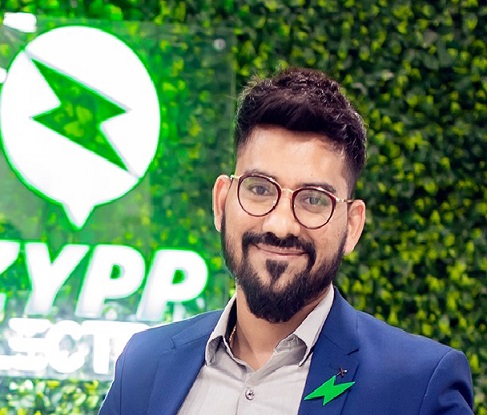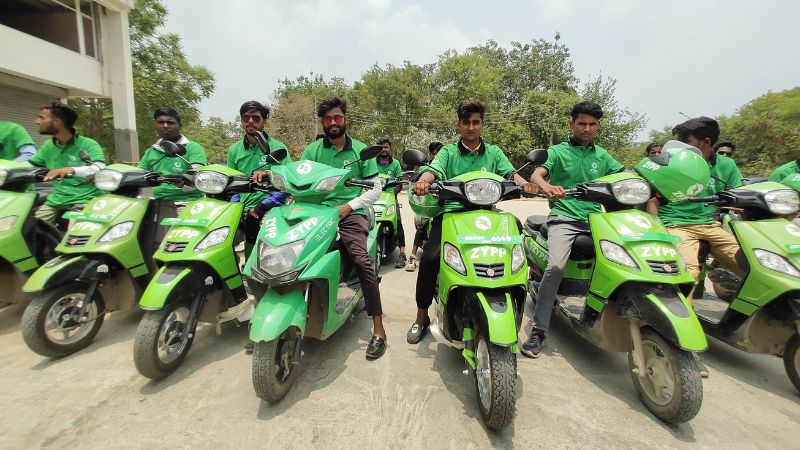EV-as-a-service: Understanding the business model and its relevance

Founded in 2017, Zypp Electric is a leading EV-as-a-Service platform helping deliver groceries, medicines, food, and e-commerce packages from point A to point B through electric scooters. The start-up enables businesses and delivery executives to make last-mile deliveries through an asset-light model.
Currently, Zypp has a 16,000+ strong EV fleet operating in Delhi-NCR and Bengaluru. Akash Gupta, Co-Founder & CEO of Zypp Electric, explains some of the fundamentals of the EV-as-a-service business model and its relevance for different stakeholders in the delivery ecosystem.
What are the fundamental economic principles that underpin the ‘EV-as-a-Service’ business model?
The EV-as-a-service business model addresses key challenges faced by delivery executives and e-commerce companies and helps them switch to EVs.
- For delivery executives, a significant economic incentive lies in the reduction of upfront costs and ongoing expenses. Currently, around 99% of delivery executives rely on petrol vehicles. Owning a two-wheeler includes substantial initial down payments, monthly EMI payments, and significant petrol expenses of around INR 8-9k per month. If a delivery executive earns INR 20,000, around INR 10,000 goes towards these expenses, and on the other hand, if they opt for EV-as-a-service like Zypp Electric, the cost they bear is reduced significantly. Instead of making a down payment and paying EMIs, they can select a daily rental scheme to use electric bikes. It also saves a significant portion of their earnings, which were earlier allocated to vehicle-related costs. For instance, if a delivery executive earns INR 20k per month, they can save up to INR 15,000 instead of just INR 10,000 when using a petrol-powered vehicle. By switching to EVs, delivery executives can increase their savings by 50%.
- The economic rationale extends to the companies, such as food delivery platforms like Zomato and Swiggy, that partner with ‘EV-as-a-Service’ providers. In the traditional model, where drivers own their petrol-powered bikes, there is a notable challenge of high driver churn, with a turnover rate as high as 35%. Herein, companies have to continue acquiring new delivery executives. By collaborating with platforms like ours, they can mitigate this challenge.
We take care of driver hiring, onboarding, and driver management, thus reducing the administrative burden and costs for the companies. Moreover, since we provide electric bikes, the driver churn rate is considerably lower. This benefits both the delivery drivers and the partnering companies. The drivers experience greater stability and job satisfaction, while the companies reduce their recruitment costs and operational disruptions.
Please help us understand the relevance of this model for fleet operation businesses.
Our EV-as-a-service model helps reduce operational costs for businesses while adding sustainability to their mode of transport. There is a significant governmental push to transition companies towards EVs due to environmental concerns. This push is exemplified by regulations that require food delivery and last-mile mobility companies like Zomato, Uber, and Ola to electrify fleets within specific timelines. For example, the government plans to make it mandatory for ride-sharing companies like Ola and Uber to electrify 40% of their fleet by 2026.
Secondly, companies are increasingly focused on meeting their Environmental, Social, and Governance (ESG) targets, including sustainability goals. ESG performance is not only a matter of social responsibility but also has financial implications. For instance, Zomato, as a publicly listed company, is obligated to report its ESG numbers to regulatory bodies like SEBI in India. By incorporating electric fleet solutions like Zypp Electric into their operations, companies can significantly reduce their carbon footprint. It positively impacts their ESG scores and demonstrates their commitment to sustainability to investors and stakeholders.
We also offer businesses with a lower cost of supply. As I shared before, traditional ride-sharing and delivery platforms often experience high driver turnover rates, typically around 35%. This high churn rate results in recruitment and training costs, as well as operational disruptions. Zypp helps companies maintain a stable pool of drivers, significantly reducing churn. As a result, businesses can save approximately 15 to 20% on operational costs.
How does your platform handle fleet management and charging infrastructure expansion to ensure cost-effective growth?
Our approach revolves around developing a comprehensive technology stack to optimize the entire EV ecosystem. Primarily, we collaborate with suitable OEMs to customize vehicles as per our requirements. We also use our proprietary IoT software technology for effective fleet management that enables us to monitor and track critical aspects of our fleet. It includes real-time utilization tracking, vehicle location, and even monitoring spare parts usage. By having insights into our fleet’s performance, we can make data-driven decisions to optimize operations and reduce costs.
We have also integrated charging and battery-swapping systems within our platform. Drivers receive timely notifications when their vehicle requires charging or battery replacement, thereby ensuring that our fleet remains operational and efficient. There are times when drivers unexpectedly face spare part issues, tire punctures, etc. We address this by offering comprehensive support, including roadside assistance and maintenance as a service. It minimizes downtime and also enhances the overall reliability of our EV fleet.
How do you navigate the evolving landscape of policy and Government regulations?
We continually engage with government stakeholders to track policy developments to be well-informed and leverage available incentives and regulations. There is a growing emphasis on electrifying commercial vehicle fleets. We are actively working on fleet electrification, which aligns with the government’s vision. Moreover, we are creating income opportunities for delivery executives. Since it resonates with government objectives to enhance the quality of life for citizens, we gain support from government entities. We also collaborate with influential bodies like Niti Ayog to identify specific action items that can further support the growth of electric mobility. These collaborations ensure that our recommendations and concerns are heard at the highest levels of policy-making, leading to actionable policies that benefit the electric mobility ecosystem.
Also read: Zypp Electric empowers employees with INR 1.5 Cr. ESOP buyback
Subscribe & Stay Informed
Subscribe today for free and stay on top of latest developments in EV domain.






